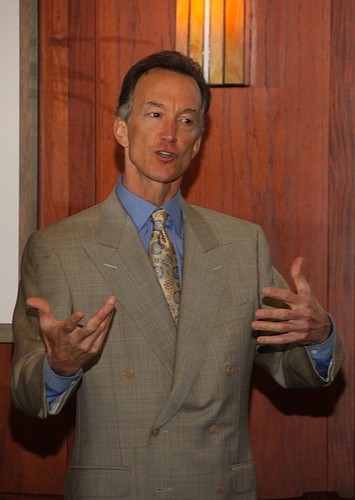Tom Grady learned a valuable lesson in the time-value of money at a young age from his father, an entrepreneur who operated a camping-trailer business in Rockledge.
The elder Grady told his then-9-year-old son he'd give him $50 for every trailer he helped sell. That was a lot of money for a child in the late 1960s, and Grady became quite the ambitious salesman, earning thousands of dollars in commissions by his early teens.
Grady recalls going to the bank to make his first deposit. “When I was 12 or 13, I went to the First National Bank of Merritt Island with what I thought was thousands of dollars,” he recalls.
The young Grady was stunned to learn from the bank teller that his thousands in commission earnings were worth just $210. That's because his father had paid him $50 savings bonds as commission checks, which are sold at a discount and only reach face value after years of earning interest. The lesson: “Your price, my terms,” Grady chuckles.
The experience stuck with Grady during his career as a securities lawyer and today as commissioner of the Florida Office of Financial Regulation. Florida Gov. Rick Scott appointed Grady, 53, to the post last summer.
Grady says his passion for securities work also came at an early age when his father took his trailer company public by merging it with a publicly traded shell company based in Utah. As a teenager, Grady listened intently as lawyers negotiated the terms. “That was exciting to me,” he says.
Grady attended Florida State University and Duke University College of Law and later joined the securities practice of Cummings & Lockwood in Naples.
A lifelong Republican, Grady edited the “Eclipse,” the newsletter for FSU Republicans, and has been actively engaged in politics since he was a student. Grady, who stays in top shape with daily swims and bike rides, was elected to the Florida House of Representatives in 2008 to represent Naples.
Considering his background in securities law and politics, it's no surprise that in August Scott appointed Grady to be commissioner of the Florida Office of Financial Regulation, which oversees state banks and securities firms.
Grady says the health of Florida banks is improving and he says state regulators want to help those banks with good management teams and directors but are still struggling with bad loans. That might include helping them resolve issues in discussions with federal regulators or assisting them in merging with a healthier bank, for example. “We want to help them succeed,” he says.
What's more, Grady says he's reviewing ways his agency can reduce redundant and burdensome regulations. For instance, well-managed profitable banks may not have to submit to as many regulatory exams.
While financial services represent only 8% of the gross state product, Grady calls the sector the “lubricant” for enterprise. “We want to reduce uncertainty at our level and persuade the federal government to do the same,” he says. “We don't want gray areas.”
Still, Grady doesn't see banking recovering to the point that investors will seek to form a new bank in Florida this year. “I see nothing on the horizon for a de novo bank,” he says.
In addition, the number of investment advisers the state will have to regulate will soon double to about 1,800 because the Securities and Exchange Commission will raise the threshold of firms the federal agency regulates to $100 million of assets under management. Any firm with less than $100 million will be regulated by the states, an increase from the previous $25 million threshold. “We're geared up for it,” says Grady.
But while Grady says his agency is ready for the increased oversight of investment advisers, he cautions that regulators can only do so much to protect investors. “We cannot protect you from every Bernie Madoff in the world,” he says. “You still have to use common sense.”
Grady says he's particularly concerned about firms that tout gold investments and currency trading today. He says the agency's mission will be to catch those who break the law, help those who play by the rules and inform the public about the difference. “It's your money,” he says. “We will do our job.”






